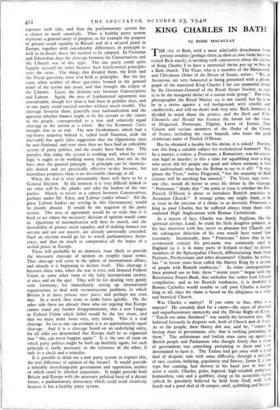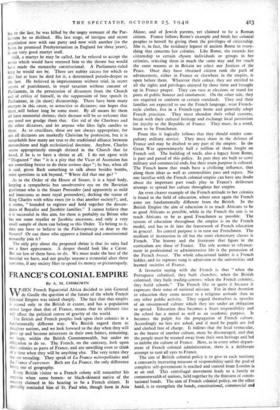KING CHARLES IN BATE
Dy ROSE NIACAULAY
HE city of Bath, with a most admirable detachment from present troubles (perhaps these, in their acutest form, havemt visited Bath-much),-is seething with controversy about the claims of King Charles I to have a memorial shrine put, up to him in a Bath church. The Vicar, who is a member of the Honourable and Chivalrous Order of the House of Stuart, writes: "We, at Ascension, are very honoured at being presented with a photo- graph of the martyred King Charles I for our memorial shrine by the Governor-General of the Royal Stuart Society, as ours is to be the inaugural shrine of a nation-wide group." For what photographer the Royal Martyr sat is not stated, but he is to be in a shrine against a red background, with crucifix and candlesticks, and will no doubt look very nice. Bath, however, is divided in mind about the project, and the Bath and Wilts Chronicle and Herald has become the forum for the views of Disgusted, Protestant, Pilgrim, Lover of Justice, Free Citizen and various members of the Order of the Crown of Stuart, including the vicar himself, who bears the good combatant name of Patrick O'Horan.
Has he obtained a faculty for his shrine, it is asked? Further, was this king a suitable subject for ecclesiastical honours? Was he a martyr, a traitor, a Protestant, a Romanizer; was his execu- tion legal or murder; is this a time for squabbling over a king who never did his people any good and whose memory is best left undisturbed; what has the Bishop to say to it all? "It may please the Vicar," writes Disgusted, "but the majority of Bath citizens will be anything but amused." The Vicar, says some- one else, would do better to erect his shrine in the vicarage. " Protestant" thinks that "the point at issue is whether the Rev.
Patrick O'Horan is about to introduce Romish practices at Ascension Church." A strange point, one might think, to be at issue in the erection of a shrine to so devoutly Protestant a king as poor Charles, but he suffered always from those who confused High Anglicanism with Roman Catholicism.
As a matter of fact, Charles was firmly Anglican, like his spiritual adviser, Laud; he made his little daughter promise, in his last interview with her, never to abandon her Church, and the subsequent defection of his sons would have -vexed him extremely. Incidentally, does " Protestant " know that in the seventeenth century his pen-name was commonly used in England (as it is in many parts of Ireland to-day) to denote members of the Episcopalian Church, differentiating them from Puritans, Presbyterians and other dissenters? .Charles, he writes, has "in recent years been called the Martyr King by a section of people with Romish tendencies." As other correspondents have pointed out to him, these "recent years" began with the Restoration Prayer-Book, that orthodox but rather Low Church compilation; and as for Romish tendencies, it is doubtful if Roman Catholics would trouble to call poor Charles a martyr king at all, since his claim is based on his allegiance to a false and heretical Church.
Was Charles a martyr? If you come to that, what is a martyr? He certainly died for a cause—the cause of absolute and unparliamentary monarchy and the Divine Right of Kings. "Touch not mine Anointed" was nearly his favourite text. He .believed fervently in despotic rule, both of Church and of State. As to the people, their liberty did not, said he, "consist in having share in government, sirs; that is nothing pertaining to them." The unfortunate and foolish man came up against a British people and Parliament who thought firmly that a share of government was something pertaining to them and were determined to have it. The Tudors had got away with a good deal of despotic rule with some difficulty, through a mixture humourless, vain and a quibbler, clung to his autocratic rights a low of tact, caution, bullying, popularity and finesse; James I, type but cunning, had thrown in his hand just in time to avert a crash; Charles, prim, bigoted, high-minded, pompous, (which he genuinely believed he held from God) with both hands and a good deal of ill-temper, until, quibbling and betraY- ling to the last, he was killed by the -angry remnant of the Par- liament he so disliked. His last stage, of intrigue and secret negotiation now with one party and now with another (to the Scots he promised Presbyterianism in England for three years), is not very good martyr stuff.
Still, a martyr he may be called, for he refused to accept the terms which would have restored him to the throne but would have made the monarchy constitutional. A Parliament-ruled king he would not be. There are nobler causes for which to die; but at least he died for it, a determined pseudo-despot to the last. He believed in imprisonment' without trial, in secret courts of punishment, in royal taxation without consent of Parliament, in the persecution of dissenters from the Church and of critics of himself, in the suppression of free speech in Parliament, in (in short) dictatorship. There have been many martyrs in this cause, so attractive to dictators; one hopes that there, will before long be some more. By all means let them all have memorial shrines; their decease will be so welcome that one need not grudge them that. Get rid of the Charleses and the other dictators, and let anyone who likes light candles to them. As to crucifixes, these are not always appropriate, for not all dictators are markedly Christian by profession, but it is remarkable how many are true to the traditional alliance between monarchism and high ecclesiastical doctrine. Anyhow, Charles seems appropriately enough shrined in the Church that he loved, if he is to have a shrine at alL I do not agree with " Disgusted " that "it is a pity that the Vicar of Ascension has not something better to do these serious days "; he has, when all is said, given Bath something to talk about besides bombs, some questions to ask beyond, "Where did that one go?"
As to the Order of the House of Stuart, it is a loyal body, keeping a sympathetic but tutsubversive eye on the Bavarian gentleman who is the Stuart Pretender (and apparently as mild and innocuous as most royal pretenders), decking the statue of King Charles with white roses (or is that another society?), and, it seems, "founded to register and hold together the descen- dants of Royalist and Jacobite families." I cannot believe that it is successful in this aim, for there is probably no Briton who has not some royalist or Jacobite ancestors, and only a very small sample of them can belong to this Order. To belong to it, does one have to believe in the Fiihrerprinzip so dear to the Stuarts? Or can those who approve a limited and constitutional monarchy join it?
The only pity about the proposed shrine is that its saint had not a finer appearance. A despot should look like a Cxsar. But too few of them have, or do. We must make the best of the material we have, and not grudge anyone a memorial after three centuries, if any society likes to spend its money so picturesquely.



























 Previous page
Previous page